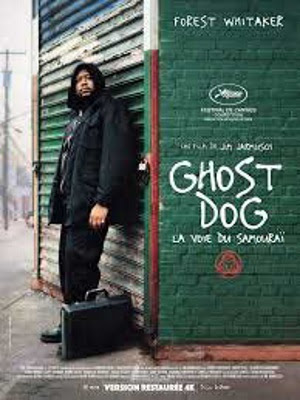Ghost Dog - The Way
of the Samurai
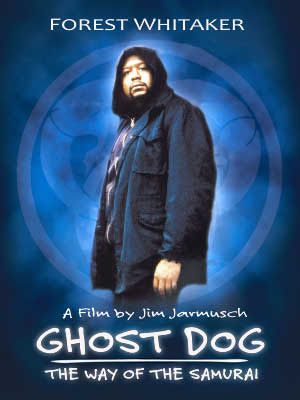
Director: Jim Jarmusch
Year: 1999
Rating: 8.0
A hitman
film directed by Jim Jarmusch might seem unexpected from the man who helmed
Mystery Train, Stranger Than Paradise and Coffee and Cigarettes, but he takes
this well-worn genre and gives it a makeover. Like his early films, it is
quirky, observant and whimsical often digressing into philosophy and elements
that have little to do with the plot but are absolutely captivating. Those
bits and pieces - often humorous - make this film so engaging. He creates
a character - especially written for Forest Whitaker - that is one of a kind.
The Last Samurai in a time where honor no longer is relevant to most, but
he still lives by the code of Bushido. At the same time, he pays homage
to the classic hitman films by co-starring Henry Silva who was probably a
hired killer in more films than he could remember. One of the great ones.
Here he plays the Don of a Mafia Clan whose best days were back in the time
when Carlo Gambino and Vito Genovese were bosses. All of his gang should
be retired and living in Florida betting on the dogs. Things are so bad that
they can't even pay the rent on their headquarters. They like watching cartoons
on the television. Though Jarmusch pokes fun at them, they are still Mafia
and live by that code.
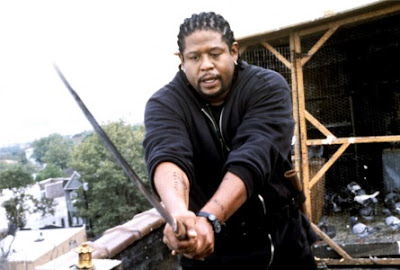
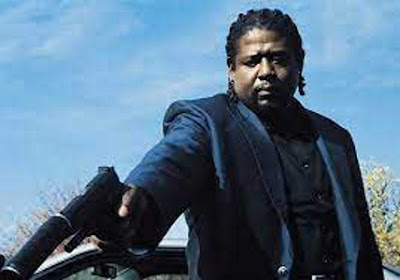
Ghost Dog is a hitman. How he came to be
that would be a story in itself, but the film never says. Just that at one
time he is being beaten up by three punks when Louie (John Tormey) passes
by and stops it. Four years later Ghost Dog appears at his door and tells
him that he owes him and any favors he needs done, Ghost Dog is obliged by
his code. Louie is a lower-level mobster. In those four years Ghost Dog has
mastered the art of killing and become fully enjoined into the Samurai code.
He reads from the Hagakure aka The Book of Samurai written in the 1600s by
an attendant to Nabeshima Mitsushige, a daimyo of the period. The book is
a collection of the thoughts and writings of his master. Ghost Dog lives
on a rooftop with his friends, the pigeons - which he uses to communicate
with Louie. Because Louie has taken him up on his offer and Ghost Dog has
carried out a number of hits over the past years - flawlessly.
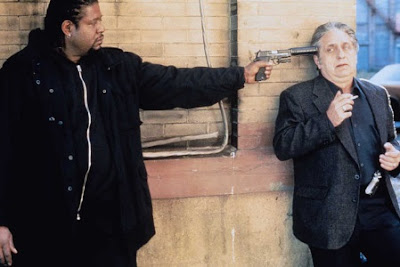
Ghost Dog's only human friend is the man
who sells ice cream in the park. Raymond only speaks French and Ghost Dog
only speaks English. But they communicate - often Ghost Dog saying the same
thing in English that the Haitian (Isaach De Bankolé) has just said
in French. He also meets a small girl in the park and lends her a copy of
the book Rashoman. How he got that is the story. Ghost Dog is assigned another
killing - of a mafia member who got out of line. He sneaks into his home
and plugs him - three shots - and then notices a young woman sitting - reading.
A hitman would of course kill any witnesses - but he lives by a different
code - and so lets her live - particularly when he sees the book she is reading
is Rashoman. Jarmusch thanks Akira Kurosawa in the end credits.
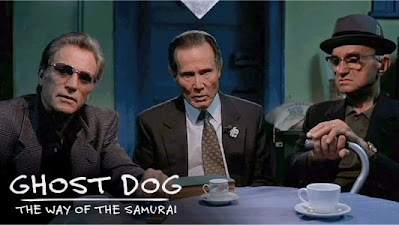
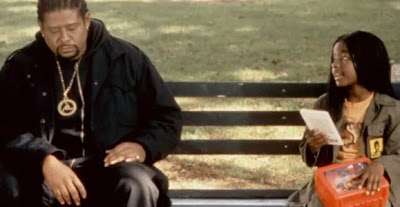
The girl is the daughter of the head of
the gang (Silva) who decides that the hit needs cleaning up - and when he
finds out that the assassin is black and his name, he goes into a bizarre
and funny rant on nicknames. But he wants him dead - he killed one of us
(at his orders but still) and tells his righthand man (Cliff Gorman) to get
it done. But these are a bunch of old guys who nearly have a heart-attack
getting up to the roof. Then Ghost Dog decides he needs to visit them. The
film is paced at its own unrushed desire - sitting in the park, reading from
his book, walking through the neighborhood where everyone knows him but not
what to make of him, driving through the city at night and seeing the dreamy
world at its worst. Little things like a mugger about to attack an old man
and the old man kicking his ass with kung-fu. In many ways large parts of
the film could have been in any of his films from that period - he just injects
a hitman into it. Whitaker is astonishingly charismatic in this though he
rarely shows any emotion or utters any unneeded words - just how he walks
and stares is enough. Perhaps every male director has a hitman film in them
wanting to get out, this was Jarmusch's.
